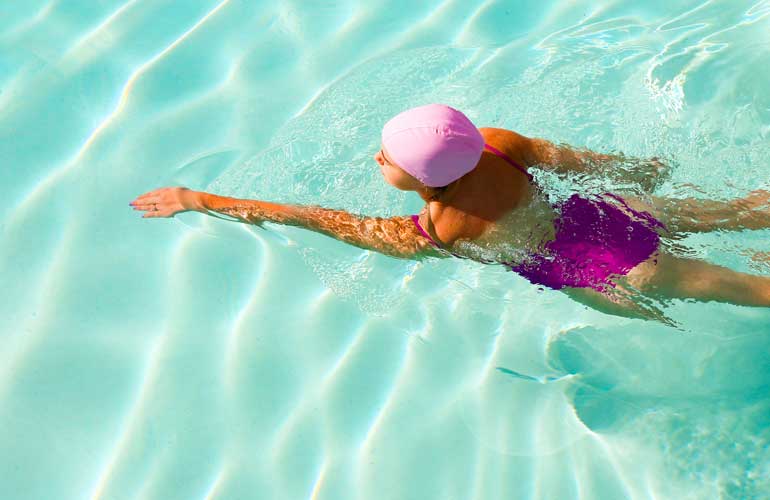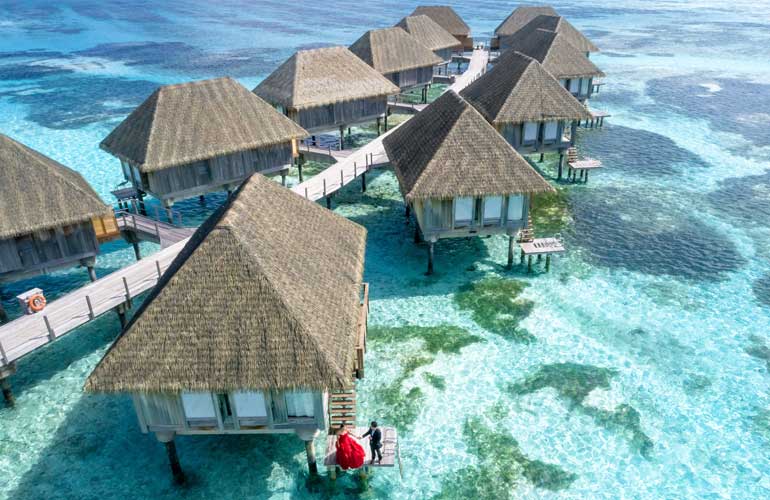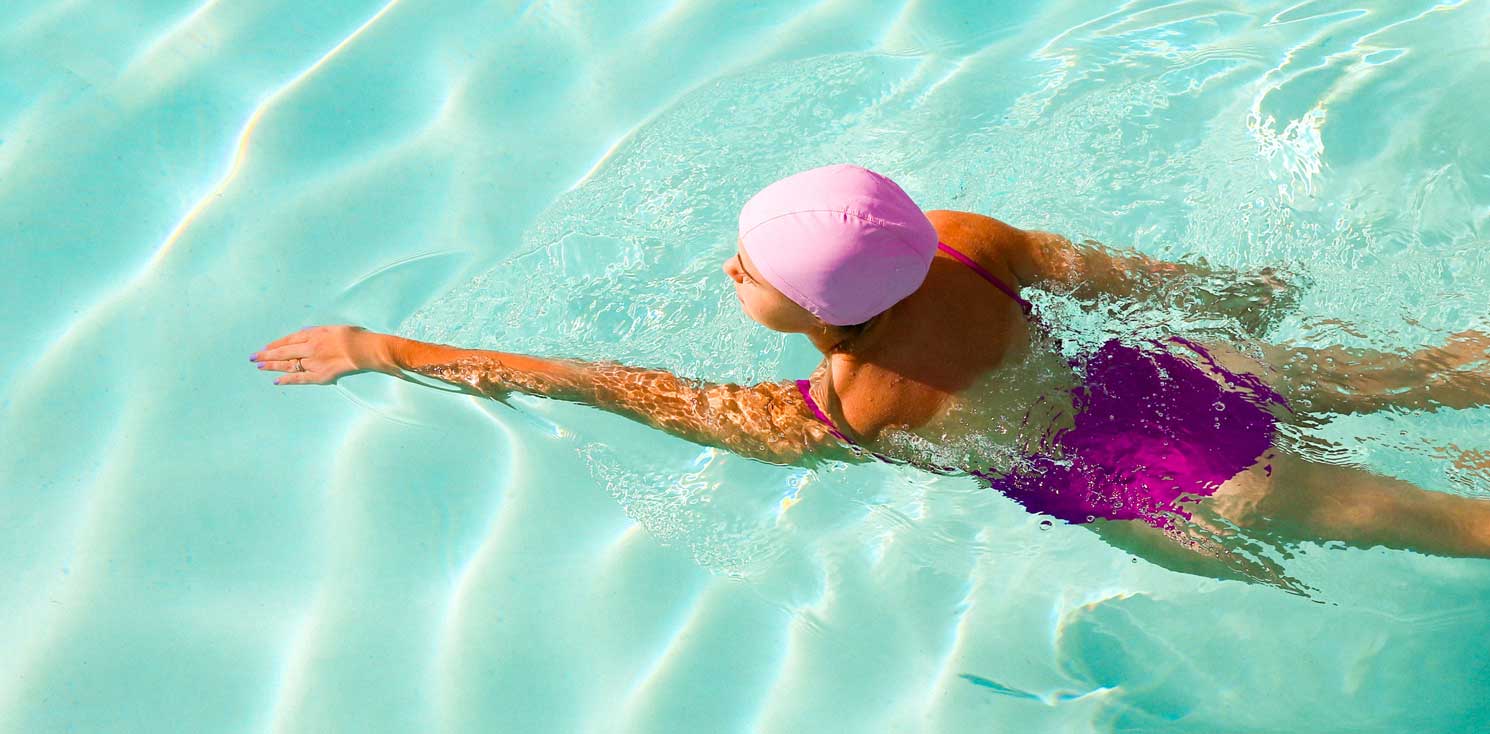When it comes to skincare, the desire for clear and healthy skin is a universal goal no matter what age you are. Acne-prone skin can be particularly challenging to manage, leading people to explore different methods and remedies to combat breakouts. One intriguing topic that often surfaces is the effect of swimming pool water on acne. So we here at Halocline thought we’d delve into the relationship between pool water and acne-prone skin, exploring the impact of chlorinated and saltwater pools, the effects of chlorine exposure, and how swimming can contribute to overall skin health.
Does Swimming Pool Water Help With Acne?
We are not medical professionals and the information in this post is just for discussion. If you would like professional acne advice, it would be best to speak to a doctor or pharmacist.
Chlorinated vs. Saltwater Pools
Chlorinated water is commonly used to disinfect swimming pools, effectively neutralising harmful bacteria. On the other hand, saltwater pools convert salt into chlorine through a process known as electrolysis. Many believe that saltwater pools are gentler on the skin due to the lower levels of chlorine, which might be beneficial for those with sensitive or acne-prone skin. However, both types of pools have their own unique effects on the skin.
Effects of Chlorine Exposure on the Skin
Chlorine, while an essential disinfectant, can have both positive and negative effects on the skin. The drying effect of chlorinated water is well-known and can lead to dry, flaky skin, particularly for those with already dry skin types. This can be an issue for those who swim regularly in chlorinated pools, not only for their skin but also for their hair. We’ve covered the most effective ways to protect your hair whilst swimming in one of our earlier posts. Head over and take a read.
Excessive exposure to chlorine can strip the skin of its natural oils, potentially exacerbating acne issues. It's essential to be cautious, especially for swimmers with sensitive skin or existing skin conditions like atopic dermatitis.
Chlorine and Acne Breakouts
The link between chlorine exposure and acne breakouts is a complex matter. On one hand, chlorine's antibacterial properties can help reduce the presence of acne-causing bacteria on the skin's surface. Additionally, chlorine can aid in exfoliating dead skin cells, which might improve the appearance of acne-prone skin. However, the drying effect of chlorine can lead to the overproduction of oil by sebaceous glands as your skin attempts to compensate for moisture loss. This excess oil can clog your pores and lead to more acne breakouts.
Chlorinated Pool vs. Sea Water
Sea water contains salt and minerals that can be beneficial for some people with acne-prone skin. The saltwater's antibacterial properties and the exfoliating action of ocean waves can help cleanse the skin's surface. However, it's important to note that spending too much time in salt water can also have a drying effect.

Saltwater Pools
Saltwater pools are often thought of as a more natural and skin-friendly alternative to traditional chlorinated swimming pools. However, you should be aware that saltwater pools still contain chlorine, albeit at lower levels. While saltwater might have less of a drying effect compared to heavily chlorinated water, it's not entirely risk free of potential side effects for acne-prone skin.
Public Pools Hygiene
While swimming in a public venue is probably the most accessible option for most people, it's essential to consider potential hygiene concerns. Public pools can contain not only chlorine but also harmful bacteria and even traces of faecal matter if not properly maintained. Showering before entering a pool can help reduce the introduction of contaminants and maintain a safer swimming environment for everyone. Take a look at our in-depth post about the cleanliness of your local swimming pool for more details.
Indoor Pools with Proper Ventilation
Indoor pools offer the advantage of year-round swimming, but they can also pose challenges for swimmers with acne-prone skin. Chlorine fumes and poor ventilation in some indoor pools can lead to skin irritation and exacerbate existing skin conditions. However, well-ventilated indoor pools with efficient air circulation systems can provide a controlled environment for swimming without compromising air quality. If you are concerned about how an indoor pool might affect your skin, why not give the pool a quick ring before you go? You can find out more about their cleaning, water testing routine, maintenance and ventilation over a quick chat on the phone.
Maximising the Benefits, Minimising the Risks
Swimming is not only one of the best exercises out there for overall health and well-being but can also have positive effects on the skin. Increased blood flow during exercise promotes healthier skin and better overall circulation. Moreover, exposure to UV rays while swimming outdoors can provide vitamin D, known for its role in maintaining healthy skin. So if you are suffering from acne or other skin problems, don’t discount swimming as the benefits may outweigh any issues you might encounter.
The Importance of A Good Skincare Routine
If you are a regular swimmer having a consistent skincare routine is crucial. After swimming in chlorinated water, you should rinse yourself off with fresh water and use a gentle cleanser to remove any residual chlorine and impurities. If you suffer from acne-prone skin, incorporating salicylic acid cleansers can help prevent breakouts. Moisturising with a lightweight, non-comedogenic moisturiser is also important for your skin.
Skin Care and More
Maintaining healthy skin involves more than just you focusing on pool water. A holistic approach includes a healthy diet, drinking lots of water and a consistent skincare regime. A diet rich in antioxidants, vitamins, and minerals can contribute to skin health by providing essential nutrients that support your skin’s repair and regeneration processes. Skincare rarely comes down to just one thing.
If you are looking to achieve clear and healthy skin, understanding the effects of pool water on acne-prone skin is essential. While swimming in both chlorinated and saltwater pools can have both positive and negative effects, a balanced approach is key. Regular cleansing, moisturising, and being mindful of excessive chlorine exposure can help swimmers with acne-prone skin enjoy the benefits of swimming while minimising potential risks. Ultimately, maintaining overall skin health involves a combination of proper skincare, a healthy lifestyle, and informed choices about the pools you swim in.
There are some amazing pools around the world that have been designed with skincare in mind, so if you want to combine a trip abroad with one that will care for your skin, why not try one of these destinations?
St. Kitts & Nevis
The picturesque islands of St. Kitts and Nevis boast more than just stunning beaches. These islands offer luxurious resorts with pools that use saltwater chlorination systems. The gentle saltwater not only provides a refreshing swim but also brings potential benefits for acne-prone skin. The islands' natural beauty, combined with the skin-friendly properties of saltwater, can create a truly relaxing and rejuvenating experience.
The Maldives

The Maldives is renowned for its overwater bungalows and crystal-clear waters, but it's also home to some of the most exquisite pool experiences. Many resorts offer private pools with meticulously maintained water quality. These pools often utilise advanced filtration and chlorination systems that prioritise guest comfort and skin health. Enjoy the serenity of your private pool while indulging in the natural beauty of this tropical paradise.
Iceland's Blue Lagoon
For a unique and therapeutic pool experience, Iceland's Blue Lagoon is a must-visit destination. This geothermal spa features a mineral-rich pool formed from natural hot springs. The high mineral content of the water, rich in silica and sulphur, can have exfoliating and skin-soothing effects. The lagoon's unique environment, surrounded by lava fields and steamy waters, offers a rejuvenating experience that can benefit acne-prone skin.
Bali, Indonesia
One of my favourite destinations is the stunning Indonesian island of Bali. Bali's reputation as a wellness destination extends to its pool offerings. Many luxury resorts on the island feature pools with breathtaking views of lush landscapes or serene ocean fronts. These pools often incorporate environmentally friendly practices and use fewer chemicals, providing a gentler environment for sensitive or acne-prone skin. Bali's holistic approach to wellness, which includes traditional spa treatments and natural skincare remedies, can contribute to an improved complexion.
Swiss Alps
For those seeking a mountainous escape, the Swiss Alps offer wellness pools amidst breathtaking scenery. Many of these alpine resorts feature pools that draw water from nearby natural springs. The pure and mineral-rich water, free from harsh chemicals, can have a positive impact on your skin health. Immerse yourself in the tranquillity of the Swiss Alps while benefiting from the refreshing and nourishing effects of natural spring water. Fresh water, fresh air. Is there anything better?
Dead Sea, Jordan
While not a traditional pool, the Dead Sea's unique waters deserve a mention for their potential benefits for acne-prone skin. The Dead Sea's high salt and mineral content have been renowned for their therapeutic effects on various skin conditions. Floating in its mineral-rich waters can exfoliate dead skin cells and cleanse the skin's surface. The natural healing properties of the Dead Sea can provide relief and improvement for those with acne-prone skin.
So whether you are swimming in your local pool or taking a dip in Iceland’s Blue Lagoon, swimming can be beneficial to your health, well-being and skin, as long as you prepare ahead.

